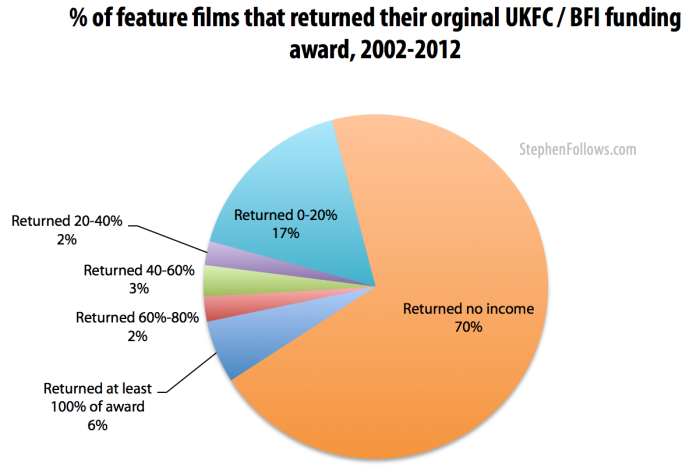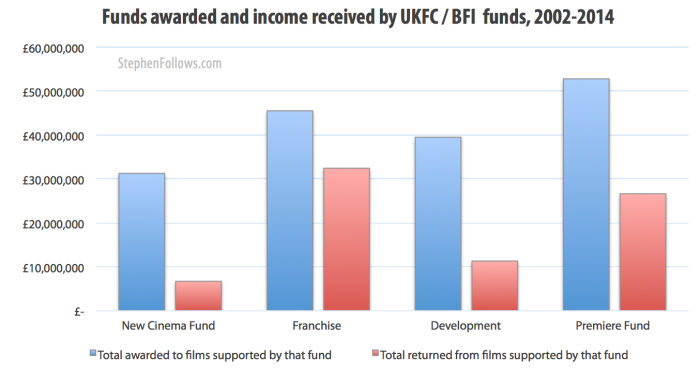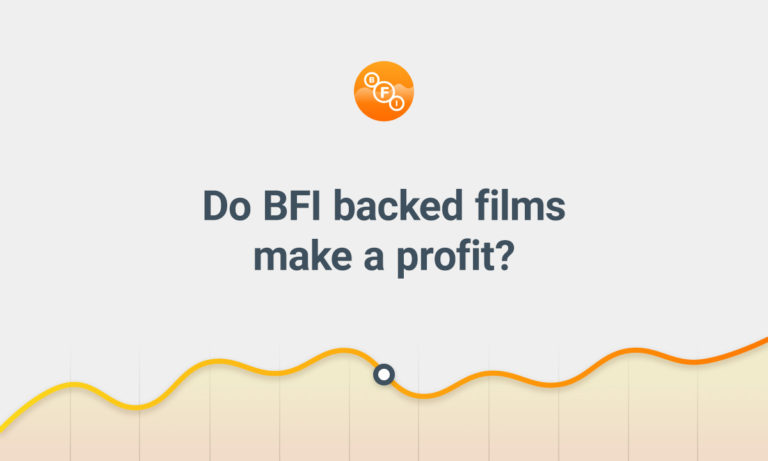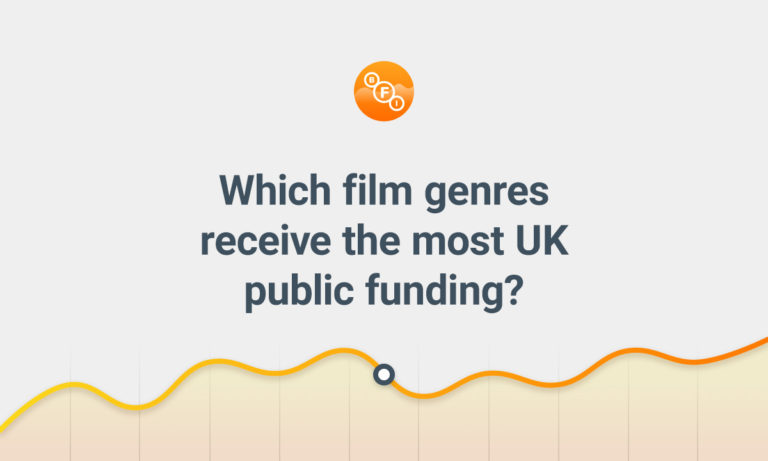 Last week I looked at the previous six year’s worth of financial accounts for the UK Film Council (UKFC) and the BFI, focusing on the recoupment stats. I have since managed to build a complete set of accounts for the 12 years between 1st April 2002 and 31st March 2014.
Last week I looked at the previous six year’s worth of financial accounts for the UK Film Council (UKFC) and the BFI, focusing on the recoupment stats. I have since managed to build a complete set of accounts for the 12 years between 1st April 2002 and 31st March 2014.
In summary…
- Across all BFI funded films between 2002-14, the UKFC / BFI has received 37.6% of its money back
- 29.4% of UKFC/ BFI funded films have returned at least £1
- Only 5.8% have returned the full amount they were awarded
- The highest returning funding scheme was the Franchise Funds, which returned 71% of its investments
- The average development award was for £62,291
- Half of development funding awards were under £25,000.
- Of those feature films awarded development funding, 24% returned at least £1 to the UKFC / BFI.
Topline figures on BFI funded films
Over the past 12 years, the BFI (and the UKFC before it) have awarded £274,742,816 directly to the development, production and promotion of film projects. (They also spent far more on training, education and other events – see here for details).
These BFI funded films have generated an income of £103,211,671 for the BFI, which is a 37.6% return. That’s fairly impressive, seeing as their aim is not to make entirely commercial investments. I wrote last week about the BFI’s aims.
Out of the 1,182 feature films the UKFC / BFI awarded money to, 29.4% have returned at least £1 to the BFI to date. 68 films have returned the full amount they were awarded, just 5.8% of the feature films backed by the BFI.

Only one film has ever returned more than twice what it received, namely The King’s Speech, which has so far repaid 838% of its £1million award.
The four biggest funds
Over the years, the UKFC / BFI have had a number of award funds which filmmakers could apply for. Currently there are only a small number, the largest of which is called the ‘Film Fund’. The Film Fund hasn’t been going for long enough to truly assess how its BFI funded films will perform. However, some of the UKFC’s old funds have been around long enough to look at the recoupment stats.
The stats below relate to all funding given to BFI funded films which have benefited from the stated fund. This means that if a film received development funding then these figures will include all of the funding the UKFC/ BFI spent on that film, not just the development funding. So these results do not tell us how each fund fared, but rather, how the films that each fund affected have fared.

New Cinema Fund
 The NCF supported “emerging talent and established filmmakers working outside the mainstream, focusing on innovative writing and gifted directors”.
The NCF supported “emerging talent and established filmmakers working outside the mainstream, focusing on innovative writing and gifted directors”.
- Awarded to 152 feature films
- Largest single awards: Chatroom, Mrs Radcliffe’s Revolution, Sex & Drugs & Rock & Roll, Submarine and We Need To Talk About Kevin (each received £700,000)
- Highest repaying film: Intermission (£791,803 repaid)
- £31,321,561 = total spent on films benefiting at some point from the New Cinema Fund
- £6,717,551 repaid to UKFC / BFI by those films
- 21.4% repaid
Franchise Awards
 These agreements were established by the Arts Council England in 1997 and were managed by the UK Film Council between April 2000 and 2011 and the BFI after that. They awarded money to a small number of big production companies (inc DNA Films, Pathe and The Film Consortium).
These agreements were established by the Arts Council England in 1997 and were managed by the UK Film Council between April 2000 and 2011 and the BFI after that. They awarded money to a small number of big production companies (inc DNA Films, Pathe and The Film Consortium).
- Awarded to 82 feature films
- Largest single award: Sunshine (£6,528,090 awarded)
- Highest repaying film: 28 Days Later (£3,528,990 repaid)
- £45,586,295 = total spent on films benefiting at some point from franchise awards
- £32,500,452 repaid to UKFC / BFI by those films
- 71.3% repaid
Development funding
 Small funding awards to “broaden the quality, range and ambition of film projects being developed in the UK”.
Small funding awards to “broaden the quality, range and ambition of film projects being developed in the UK”.
- Awarded to at least 631 feature films
- Largest award: The Peculiar Memories (£250,000 awarded)*
- Highest repaying film: The King’s Speech (£8,552,244 repaid)
- £39,557,793 = total spent on films benefiting at some point from development funding
- £11,344,509 repaid to UKFC / BFI by those films
- 28.7% repaid
Note: The 2011-12 accounts did not split by fund so the true figures will be slightly higher – see notes at the bottom of this article for details. This does not affect the other funds as they closed prior to 2012.
*Interestingly, I can’t find any mention online of the film which was awarded the highest amount of development funding, save for in the UKFC accounts of the time. The UKFC information states that “Pundit Best” were awarded £250,000 for the film “The Peculiar Memories” in the tax year 2007-08. There is a company called Punditbest Limited, of which one company director is Bruce Robinson. Bruce Robinson wrote a book which was adapted into a 1999 TV movie called “The Peculiar Memories of Bruce Robinson”. I presume that the quarter of a million pounds award was to turn the book into another film, but from there the scent goes cold. If anyone knows any more, please can they let me know.
Premiere Fund
 Aimed at supporting “mainstream, commercially-driven films encouraging the involvement of British creative talent in a range of films to attract international audiences”
Aimed at supporting “mainstream, commercially-driven films encouraging the involvement of British creative talent in a range of films to attract international audiences”
- Awarded to 75 feature films
- Largest award: Stormbreaker (£2,300,000 awarded)
- Highest repaying film: The King’s Speech (£8,552,244 repaid)
- £52,864,837 = total spent on films benefiting at some point from the Premiere Fund
- £26,677,413 repaid to UKFC / BFI by those films
- 50.5% repaid
Notes and caveats
Many of the notes and caveats I mentioned last week still apply. In addition…
- Dates studied – The data today come from the complete UK Film Council and BFI financial statements currently available. This covers the 12 year period between 1st April 2002 and 31 March 2014.
- BFI Typo – On page 103 of the 2005/06 UKFC financial accounts, the value of the film rights on 31st March 2006 for the ‘Slate Funding’ given to Darlow Smithson Productions Limited is listed as “375,00”. As you can see, there is either a missing zero or the comma is in the wrong place. I have presumed than the zero is missing because a) The new commitments made that year were £375,000 and b) by placing the zero the final subtotals and totals add up to match the totals given in the financial accounts.
- Missing metadata – In the 2011-12 and some of the 2013-14 accounts the BFI did not indicate which funds an award was made under (i.e. development, production, etc). Therefore these have been left out of the fund breakdowns.
- Volume and complexity of data – It’s worth noting that the volume of data, and lack of standardisation in its presentation may mean that some of these results are slightly out. A large amount of subjective manual work was needed in order to turn the financial reporting data into a useable database. This includes matching up projects despite title changes, determining which projects are features (as opposed to shorts or other projects) and coping with changing reporting standards across different years. Therefore, I suggest readers do not treat the data as accurate to the penny, but more indicative of the trends and overall patterns.
Epilogue
This will be my final post of BFI recoupment as I think I have pulled out all the interesting nuggets. However, I plan to return to the topic later on this year when the new figures are released.
I also have a long-term aim to provide an easier way for everyone to access the data as the current format is difficult to read. More soon.





Comments
Great research, it would be fascinating to see the breakdown of recoupment on a film by film basis to gauge how films perform v perception of success.
I gather that Under the Skin was funded to the tune of £2m by the BFI but that investment is destined to be one of the 70% with no returns, and the BFI accounts already show a 100% write off. The UK DVD numbers were very poor as well.
As these funds mostly come from lower income lottery players it is interesting to see how they effectively fund the “above the line” costs of the stars/ producers/ director etc. Matthew Vaughn points out in part one of Mark Kermode’s great three part iPlayer radio series on the film production business (still available) that Under the Skin, made by millionaires from the commercials industry, should have been made on a smaller budget commensurate to its audience size and with above the line fees deferred to be paid from performance. Yet it was deemed worthy of such a high public reward. I think a much higher return would have yielded from investment into the grass roots of filmmaking or small development funds for filmmakers with a feature film or two under their belts. It all does seem nicely tied up with those already in the circle.
I do wonder if they keep the data complex to avoid too much scrutiny…
Peter
I’m working on that right now. It might be a month or two but I will be providing a way for everyone to access this data in a more human manner.
Stephen
Hi Stephen, would it be possible to get in contact with you regarding my Dissertation primary research? The research question is ‘Is Culture Primarily Responsible For The Commercial Gap Between The American And British Film Industry?’ Given your experience, I have some research questions I would love to be able to send you to help supplement my study.
Really hope to hear from you.
Josh.
Sure, drop me a line via https://stephenfollows.com/contact/
S